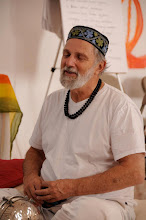Selections
from Names/Shemot in Teruma Exodus 25.1-27.19
Get centered; look in these
directions: south, north, west, east
By turning and looking these
directions: we find our center
Make me a mishkan, a
sanctuary, with your free-will offerings
(What to offer) Draw from the
gifts I’ve given you
I accept gifts offered sincerely
Make the planks of the mishkan
upright
We are the planks of the mishkan.
Through selfless actions we stand upright
And
make (yourself into)
a lampstand, a menorah
of pure gold
Not piece by piece. Let it
originate in its entirety as one menorah
A lampstand of universal love --
with 22 cups and seven lights
Seven chakras: 22 letters, 22
power symbols -- The tree of life
Imagine you’re a menorah overflowing
with loving kindness
The base of the stand is the sacred
abode of the sages
Mentally construct a wooden ark (enclosure)
And upon its gold cover conceive two
gold cherubs
Facing each other with wings
spreading out and over the ark
(Visualize) a veil of blue,
violet and crimson yarn
See the cherubs design there (showing on both sides)
A veil shall divide between the holy
and the holy-of-holies
The holiness inside the holiness
Behind this veil carry the Ark of
the Covenant with God
Inside the ark is the Sign of the
Covenant: ten letter symbols
|
A
|
B
|
G
|
D
|
H
|
V
|
Z
|
H
|
T
|
Y
|
|
Alef
|
Beyt
|
Gimmel
|
Dalet
|
Hey
|
Vahv
|
Zayin
|
cHet
|
Tet
|
Yohd
|
And
set upon the table the showbread before me always
Be sure to keep bread or other food
on our tables so
Blessings from above always rest there
– and go out to all
Thus is completed all the work of
the sanctuary
It comes to pass that the prophet in
us
Completes the sanctuary and
sanctifies it
Whatever is offered to me with true
devotion – if only a leaf, a flower, a fruit or a sip of water – I
accept it because it’s given with love. -- Bhagavad
Gita, Song of God
Notes on Terumah from the Sefat
Emet (Lips of
Truth)
“This is my God and I will enshrine
him” means I will make myself into a shrine (a mishkan) for him.
The details of the making of the
sanctuary indicate ways for us to fashion our inner chambers to make them a
proper dwelling place for God. In our souls we set up a table and raise up an
altar .. etc We build a home for God in this world.
-- (Rabbi Art Green
commenting on Sefat Emet)
Let them bring me gifts (Terumah)
Because of our yearning to be close to God who gives us instructions re the
mishkan so we can feel the closeness and the oneness.
Weekdays we build a mishkan by
our actions; on Shabbat (the Sabbath) a mishkan is given to us
(thru grace)
God is the king of peace. The Torah
is composed of the names of God. The names of God includes all the hosts of
heaven.
Re building of the tabernacle (mishkan),
we each give our own offerings, but we blend into a oneness.
Each holds his and her own
distinctive viewpoint while sharing and learning from one another and accepting
the infinite varieties of minds and opinions and views – all of which together
make up a single divine whole (Rabbi Green)
Notes on Terumah from Rabbi
Shefa Gold
God says “make for me a holy place
so I can dwell with you” In this way we can stay consciously connected with
reality and never be trapped in the illusion of separateness.
Spiritual practice is about making
our lives into a mishkan – a place where we can perceive the mystery of
the presence
In Terumah we can explore and
discern the true generosity of our hearts. When the heart is
willing there’s a commitment to the work. The divine spirit will show us
the pattern, the blueprint, the plan.
Artists of the holy – open to the
creative flow; become a clear channel for divine will
Terumah (Exodus 25-27) invites our gifts… The only gift we can give
God is ourselves, that is, our full and available presence in every moment of
our lives. Giving everything means accepting the moment
We are called to sanctify the vessel
of our lives, to become empty
And
set upon the table the showbread before Me always Ex. 25-30
A
Note from the Zohar* about Keeping Food on our Tables:
A table stands in the sanctuary and
there rests upon it blessings from above, and from it issues nourishment to the
whole world. That table never remains empty, since blessings do not rest on an
empty place. Thus the showbread is renewed each Shabbat so that always resting
on this table are the blessings from above -- that food and blessings may
emanate from here to all the tables of the world.
Let us remember after we eat – that
God has brought us to this good land, and be sure to keep some bread or other
food on our tables so that the blessings from above always rest there. Among
those blessings is more than enough food for everyone. --
Zohar [Book of Splendor] part II, 153b

